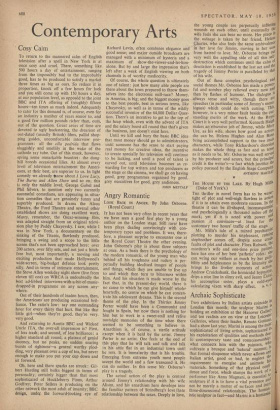Contemporary Arts
Cosy Calm
To return to the mannered calm of English television after a spell in New York is at once cosy and crueL There, something like 500 hours a day of entertainment, ranging from the impossibly bad to the improbably good, has to be produced to satisfy a market three times as big as ours. So reduce it in proportion, knock off a few hours for luck and you still come up with 150 hours a day, at our population level, as opposed to the joint BBC and ITA offering of (roughly) fifteen hours—ten times as much indeed. Adequately to cater for this demand is, of course, even for an industry a number of years senior to, and a good few million pounds richer than, ours, out of the question. Great areas of time are devoted to ugly huckstering, the dreariest of out-dated (usually British) films, pallid shop- ping guides, uncomfortable interview pro- grammes: all the olla podrida that flows sluggishly and smellily in the wake of the cathode ray tube. Out of this muck, however, spring some remarkable beauties: the dung- hill breeds occasional lilies. At almost every level of television entertainment the Ameri- cans, at their best, are superior to us. In light comedy we already *low about / Love Lucy, The Burns and Allen Show and so on; this is only the middle level; George Gobel and Phil Silvers, to mention only two currently successful comedians, are appearing in situa- tion comedies that are genuinely funny and superbly produced. In drama the Alcoa Theatre, the Ford Theatre and several other established shows are doing excellent work. Marty, remember, the Oscar-winning film, was adapted straight from an original televi- sion play by Paddy Chayevsky. I saw, while I was in New York, a documentary on the sinking of the Titanic, flawlessly produced, bringing a swing and a scope to the little screen that's not been approached here: over 200 actors, over fifty sets, and not just a hitch- free but, most importantly, a moving and exciting production that made Hollywood's wide-screen, big-budget defence look pretty silly. And in terms of intimate entertainment, the Steve Allen weekday night show (live from eleven till one) on WRCA is undoubtedly the best ad-libbed interviews-with-a-bit-of-music- dropped-in programme on any screen any- where.
Out of their hundreds of leaden hours, then, the Americans are producing occasional bril- liance. The ratio's low: say one outstanding hour for every thirty that hurt. But like that little girl—when they're good, they're very, very good.
And returning to Auntie BBC and Wicked Uncle ITA, the over-all impression is? First, of less trash; and second, of less brilliance: a higher standard all round, a plateau of genial decency, but no peaks, no sudden soaring bursts of rightness—a general worthy plod- ding, very pleasant over a cup of tea, but never enough to make you put your cup down and sit forward.
Oh, here and there sparks are struck: Gil- bert Harding still bulks biggest in terms of personality, certainly bigger than that most sophisticated of Huckleberry Finns, Arthur Godfrey; Peter Sellers is producing on the other network the most adult of insanity; BBC design, under the forward-looking eye of
Richard Levin, often combines elegance and good sense; and major outside broadcasts are managed with a minimum of hysteria and a maximum of show-the-viewer,and-let-him- alone. But by and large the impression that's left after a week of English viewing on both channels is of worthy mediocrity.
Of course, the whole question is ultimately one of talent : just how many able people are there about the town prepared to throw them- selves into the electronic mill-race? Money, in America, is big; and the biggest money goes to the best people, best in serious terms, like Chayevsky, as well as in terms of the wildly successful inventor of the 64,000 Dollar Ques- tion. There's an incentive to get to the top of the heap which, even with the advent of ITA and the salary boost all round that that's given the business, just doesn't exist here.
Until we kill and bury the basic BBC idea that most money should go to administrators, until someone has the sense to start paying real money for creative ideas, the incentive to create specially for television will continue to be lacking, and until a pool of talent is carved out, until television becomes as re- warding for top writers and top producers as the stage or the cinema, we shall go on having good, grey programmes organised by good. grey executives for good, grey audiences.
JOHN METCALF


































 Previous page
Previous page